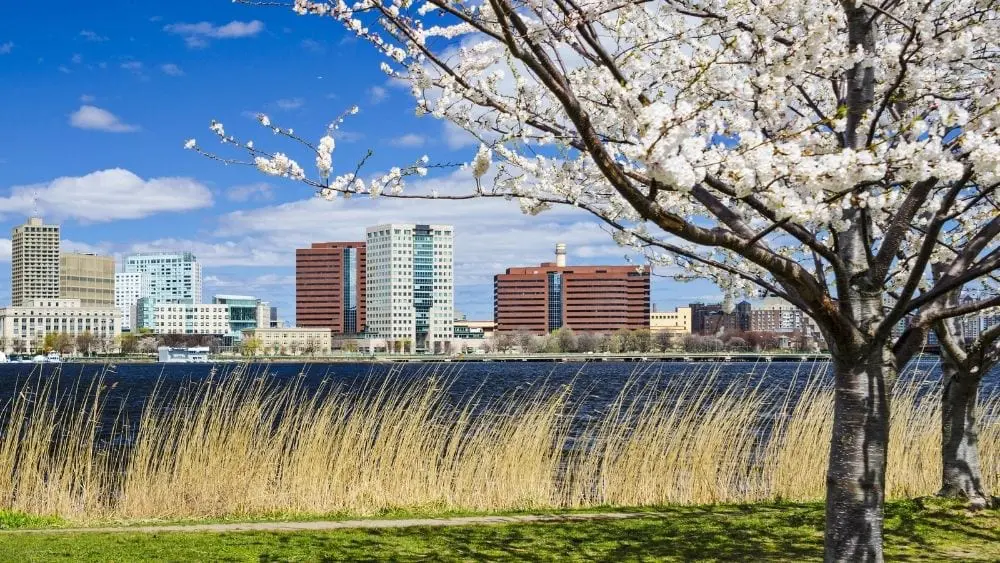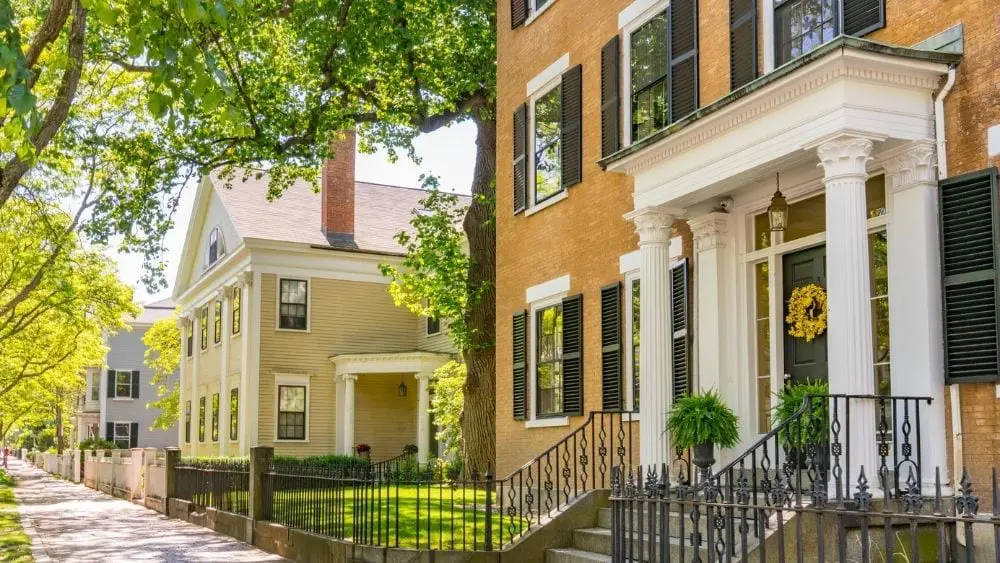
Massachusetts comes steeped in American history and packed with New England charm, so it’s easy to see why people want to buy a home here. Are you a homebuyer about to close on a new home in the Bay State?
While you may have secured a competitive interest rate for a mortgage and saved for a down payment, there’s another major hurdle you’ll need to clear: paying for closing costs.
Closing costs encompass all the administrative and legal services you’ll need to pay before you receive the keys to your new home. You pay these costs in a lump sum on closing day, and they typically amount to 2 percent to 5 percent of the home’s purchase price. Closing costs are paid alongside your down payment, which makes for one expensive day.
If you’re buying a new home in Massachusetts, NewHomeSource has put together the following guide on how much you should be saving for closing costs, a breakdown of what’s generally included, and how you can potentially lower these costs.
How Much Are Closing Costs in Massachusetts?

Closing costs in Massachusetts run, on average, $2,689 for an average home loan of $432,883, according to a 2021 report by ClosingCorp, which provides research on the U.S. real estate industry. That price tag makes up 0.62 percent of the home’s price tag.
The Bay State is in the middle of the pack, ranking 22nd among the 50 for the most expensive closing costs. The national average for closing costs is $6,087.
But homebuyers in Massachusetts need to plan on spending far more than this initial estimate. ClosingCorp’s data excludes two major closing costs you’re bound to come across — loan origination fees (if you’re taking out a mortgage) and private mortgage insurance (if you have a down payment of less than 20 percent). Both these expenses can add thousands to your closing costs tab.
Homes in Massachusetts also come with a hefty price tag these days: As of October 2021, the median sales price for single-family homes was $525,000, according to data from the Massachusetts Association of Realtors. With closing costs at 2 percent to 5 percent of this adjusted home price, homebuyers could be spending somewhere between $10,500 and $26,250.
Keep in mind, closing costs will fluctuate greatly depending on the price of your home, where it’s located, and the complexity of the sale.
What’s Typically Included in Massachusetts’ Closing Costs?

When it comes to understanding the bill breakdown of your closing costs, the expenses start tallying up as soon as you apply for a home loan. Here’s a closer look at some common charges you’ll encounter, including the state-specific details every homebuyer should be aware of.
Loan Origination Fees
Home loans don’t come for free — whether you’re working with a bank or mortgage broker, you’ll have to pay for loan origination fees to set up your mortgage application. This includes everything from underwriting your loan to providing preapproval letters for your house hunting to processing your funding.
Loan origination fees are typically about 0.5 percent to 1 percent of the loan amount.
Credit Report Fees
Before your lender decides you’re a responsible borrower, they’ll conduct a full credit check, which includes pulling your credit report to have a look at how you manage debt. Expect your lender to pass on the cost of requesting your credit report to you. If more than one borrower is listed on the mortgage application, you’ll need to double this cost.
Private Mortgage Insurance
If you aren’t providing a 20 percent down payment, your lender will expect you to buy private mortgage insurance, or PMI, in Massachusetts. PMI allows borrowers to qualify for a conventional loan even if they put down 5 percent to 19.99 percent of their mortgage. The coverage protects your lender in case of loan default.
This cost isn’t included in the ClosingCorp tally of closing costs expenses, but PMI typically ranges from 0.25 percent to 2.25 percent of your outstanding loan balance, depending on the size of your down payment and your credit score.
Attorney Fees
Under Massachusetts law, all residential real estate closings are handled by an attorney, so you’ll need to hire one to manage your home purchase.
The attorney is responsible for a lot of the heavy lifting involved with closing on your home: They must draft and certify legal documents, order a title examination, check that there aren’t any unpaid taxes or charges on the property, and coordinate title insurance for you and your lender.
Before closing day, your attorney will also liaise with your lender to make sure your mortgage will be processed on time. They’ll meet with you and the seller at the table on closing day to facilitate the transfer of the deed and release funds held in a third-party escrow account to all relevant parties.
Legal fees may be pricey, but they’re worth every penny. Your home purchase is the single biggest purchase you’ll make so you’ll want to make sure your best interests are factored into all contracts and documentation.

Title Search
When your closing attorney verifies the seller’s right to transfer ownership, they’ll order a thorough search of the home’s title history. The last thing you want is to hand over your life savings to buy a home only to find yourself in a legal battle over ownership.
The title examination that’s conducted includes poring over historical records, including deeds and court records, to make sure the land you’re buying isn’t tied up in ownership disputes, unpaid taxes or lawsuits. You’ll need to pay for this step whether you’re buying a brand-new build or an existing home.
Title Insurance
After the title search, the attorney will help you with purchasing the necessary title insurance for both you (owner’s policy) and your lender (lender’s policy). Title insurance protects both parties in case of “defects in title,” which is basically when something is missed during the title search or there are claims on the property.
Buyers pay for the title insurance premiums in Massachusetts. This is a one-time expense, so the insurance applies for as long as you’re the homeowner of the property you’re about to purchase.
Appraisal
Before closing, your lender will send a third-party appraiser to your new home to make sure it is priced at the right value. If you default on your mortgage, your lender needs to know they can sell the property if it goes into foreclosure to make up for the outstanding balance.
The appraiser will evaluate the home’s size and condition, as well as how it stacks up to homes priced similarly in the community, to determine its fair market value.
Home Inspection
Hire a professional home inspector to evaluate the health and safety of your potential new home, from the foundation to the roof and everything in between.
Pay close attention to your home inspector’s feedback: They will point out any existing issues as well as ones that could surface in the coming years, such as needing to replace major appliances or an aging roof. This is great intel because you can negotiate with the seller regarding any fixes before finalizing the deal.
Real Estate Transfer Tax
Transfer taxes are local and state government taxes that are paid as the seller transfers the home to the buyer. They could be listed as a deed tax or stamp tax on your closing costs bill.
In Massachusetts, the basic transfer tax rate in $2.28 per $500 of property value. That’s a lot compared to other states. You may encounter additional transfer taxes depending on the county you live in, too.
Sellers usually pay for transfer taxes, but this isn’t set in stone. You and the seller may allocate this expense to you during negotiations.
Don’t forget the recording fee. Your municipal recording office may charge a fee for recording the transfer of the deed in public records.
Property Taxes
Massachusetts has some of the country’s highest property taxes at 1.15 percent, on average, of a property’s assessed fair market value, according to the Tax Foundation, a decades-old tax policy nonprofit. The rate will vary depending on which county you live in.
Property tax is billed on a quarterly basis, so watch out for due dates. This is a prepaid expense, meaning it must be paid for in cash and can’t be rolled into your home financing.
Homeowner’s Insurance
By closing, you will need a homeowner’s insurance policy paid for and in effect for the year. Home insurance is a mandatory purchase before transferring your mortgage so you can buy your house. This is another prepaid expense that can’t be rolled into your home financing.
Home insurance is crucial to have in effect by the time you take ownership because it covers any physical damage to your home caused by fire, wind, vandalism, or theft.
In Massachusetts, it’s worth checking to see if you need additional policies to cover severe cold weather, snowstorms or flooding. Your lender or home insurance provider may require a survey or elevation certification to categorize your home’s flood risk and insurance requirements.
How Can I Lower My Closing Costs in Massachusetts?

With expensive real estate and pricey closing costs, homebuyers in Massachusetts may be facing some sticker shock. But there are many ways you can lower your closing costs. Here are some key strategies:
Closing Cost Assistance
Homebuyers should take advantage of Massachusetts’ homeownership assistance programs to put a significant dent in their closing costs.
If you’re a first-time homebuyer in Brockton, for example, you may be able to qualify for up to $15,000 in financial assistance to help with your home purchase. From Fall River to Holyoke and Medford, you can access plenty of local programs that include down payment and closing cost assistance.
Get Your Finances in Shape
Your goal is to secure a low-interest rate, which could save you thousands of dollars over the lifetime of your mortgage. Thus, it’s worth getting your financial ducks in a row before heading to your mortgage broker’s office. Pay off your debts, don’t miss any payments on your bills, and steer clear of applying for more credit.
Save as much as you can for your down payment, too. The closer you get to the 20 percent down payment threshold, the less you’ll have to pay in PMI.
Comparison Shop
Shop around for the best interest rate on your mortgage loan or for any other service providers you’ll need during the homebuying process. Read through reviews, check out referrals from family and friends and obtain quotes from service providers to find the best deal.
Seller Concessions
During routine back and forth negotiations on the home sale, you may be able to reassign some of your closing costs to the seller, especially if you’re in a buyer’s market.
You could, for example, ask the seller to pay for some or all of your closing costs if you offer to submit a full price offer on their home. If you’re buying a fixer-upper, you could ask the seller to pick up your closing costs tab in exchange for the repairs you may need to make.
Negotiate Fees
If you’re an established customer with multiple loan products in good standing with your lender, you might consider asking them to omit expenses tied to your mortgage application. The most obvious ones are often labeled as “junk fees,” such as rate lock fees, loan processing fees and broker rebates.
No-Closing-Cost Mortgages
With a “no-closing-cost” mortgage, your lender agrees to pay for part or all of your closing costs while you pay a higher interest rate on your mortgage. Run some calculations before you decide that this is the best route for your bottom line. In the long run, this could cost you more money because of the bump in your interest rate.
Adding Closing Costs to Your Home Financing
Homebuyers who can’t come up with the cash for their closing costs may opt to roll this expense into their home loan. Instead of paying for their closing costs on closing day, the total is added to the monthly mortgage payments. This is a convenient way around paying for closing costs upfront, but you’ll pay interest on your closing costs across the life of the loan.
Other Massachusetts Resources

Carmen Chai is an award-winning Canadian journalist who has lived and reported from major cities such as Vancouver, Toronto, London and Paris. For NewHomeSource, Carmen covers a variety of topics, including insurance, mortgages, and more.
